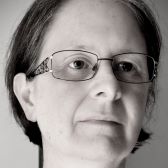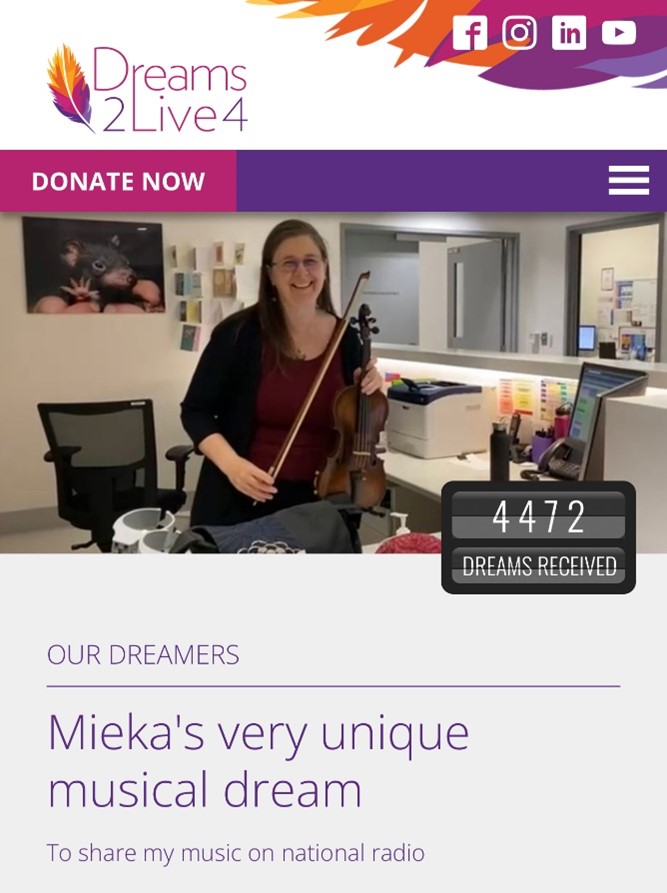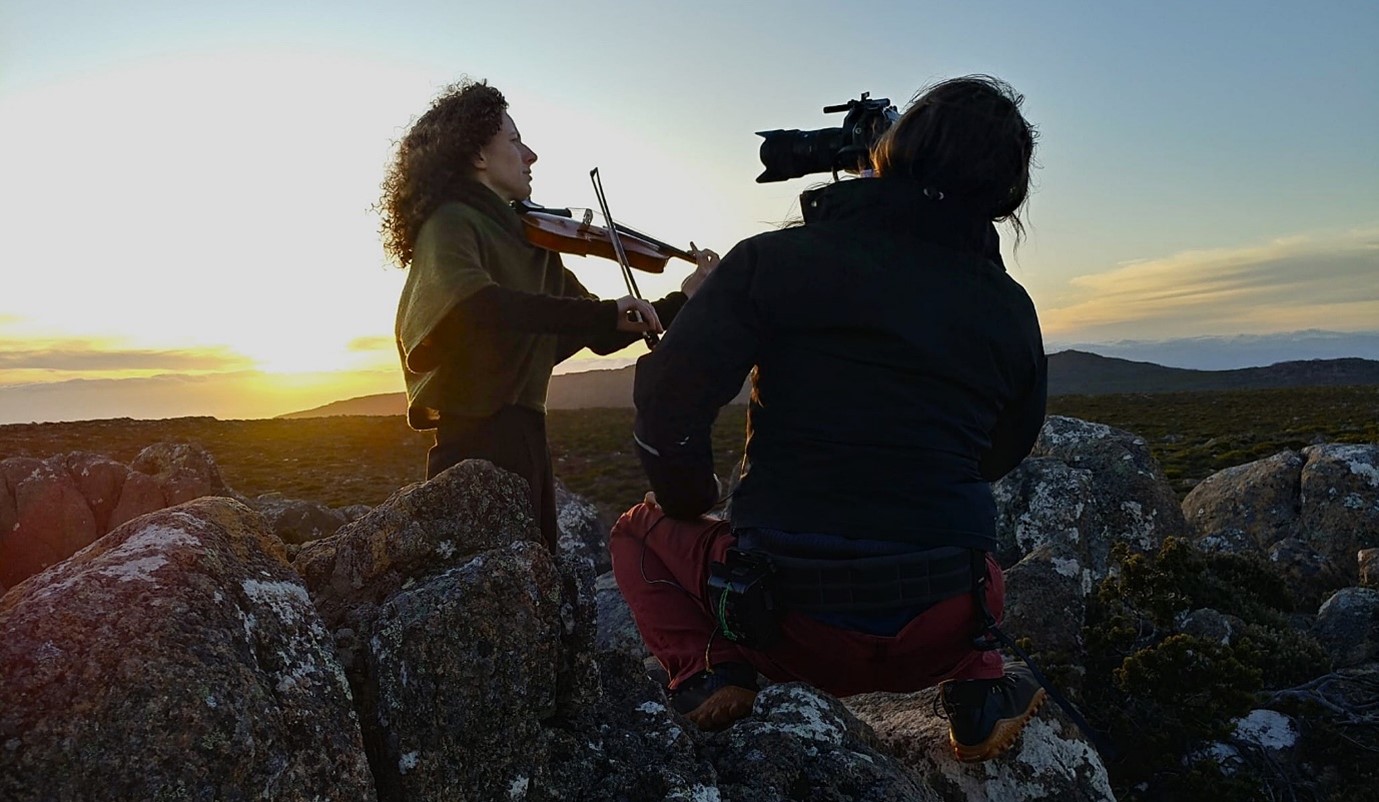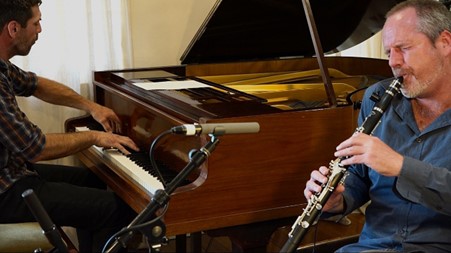21 January 2025
Sorrow for Ukraine
Making a difference and leaving a legacy
 Image: Mieka Tabart
Image: Mieka Tabart What would be number one on your 'bucket list' if life as you knew it came to a crashing halt? For me, it was composing.
In 2021, I was unexpectedly diagnosed with metastatic breast cancer, also known as stage four breast cancer, the most advanced stage. The cancer had already spread around my body. While treatments may slow the cancer's progression, they currently can't cure it.
With the startling shock of a life-limiting illness, my priorities came sharply into focus. And top of the list was composing.
Until then, I was mostly a closet composer with a piano sonata, a piano miniature and a work for solo violin scribbled in pencil on manuscript paper and hidden away in a dusty drawer.
Then three things happened: the deadly diagnosis, my 'bucket list' epiphany, and Dreams2Live4.

Dreams2Live4 is a charity organisation that helps make 'dreams' come true for adults with metastatic cancer. As I looked through their website at the dreams they had brought to life for their 'dreamers', I came across a singer-songwriter whose dream was to have her song played live on radio. Instantly, I knew what my dream was: to have my piano compositions professionally recorded and played on ABC Classic. Having incurable cancer has made it crystal clear that my biggest priority and passion in life is to share my creativity with others.
I am deeply grateful to Dreams2Live4 for making my dream come true in 2022, to Tamara-Anna Cislowska for recording my Piano Sonata No.1 and Un Piccolo Momento, and to ABC Classic for agreeing to not only broadcast these works but also offer me an interview with Russell Torrance.
My Piano Sonata No.1 was written about 20 years ago during a difficult time in my life with the end of a significant relationship, health issues and some profound soul-searching. The full work, comprising four movements, journeys through turbulence and pathos before emerging, tentatively at first, into new-found clarity, hope and purpose.
Un Piccolo Momento (A Little Moment), is about being fully present and open to the wonder and beauty of the many small, delicate moments in life that can so easily pass us by through busyness, haste or distraction. It could be noticing the slow formation and transformation of cloud patterns in the sky, or stopping to watch and listen to water cascading over smooth rocks in a small stream, or pausing and smiling at the interplay of sunlight and shadow dancing on a fern frond or palm leaf.
The exquisite playing of Tamara-Anna, her metamorphosis of my tiny black dots (a Morse code of sorts) into a wordless, wondrous, profound abstract expression of deeply felt human emotion was truly transformative for me. It instilled in me courage and belief to continue my composing journey for as long as my cancer allows and to share that journey with others.
The first movement of my piano sonata and Un Piccolo Momento can be heard here. The final movement of my piano sonata can be heard at 5:07, toward the end of my 2022 interview with Russell Torrance by scrolling down this page.
With this newfound courage and commitment I released Reminiscence in 2023, my work for solo violin, performed by Emily Sheppard and filmed on my beloved kunanyi (Mt Wellington): the ever-present, ever-grounding mountainous backdrop to nipaluna (Hobart) in my home state, lutruwita (Tasmania). This was the third of my dust-collecting, back-of-the-drawer compositions.

Filming Reminiscence on kunanyi (Mt Wellington)
At the time Reminiscence resurfaced in my life, I was reading about the Japanese death poem. Apparently it's written when a person is approaching death and is both a reflection on death and an observation of life. In the context of my advanced cancer diagnosis, I think of this work as perhaps my musical equivalent of the Japanese death poem. It begins with simple innocence, such as a child naively entering the world and beginning life anew. It then moves into anguish, pathos and isolation, reflective of challenges we inevitably encounter in life, before ending with contemplative acceptance.
The music film of Reminiscence premiered at the 2024 London Mountain Film Festival and was also accepted into and screened at the 2024 Toronto Short Film Festival. You can watch Reminiscence here.
While recording Reminiscence, I learnt from Emily that Danny Healy was soon to be leaving nipaluna (Hobart) to once again live and work overseas. I'd been discussing with Emily my Sorrow for Ukraine idea and that I envisaged Danny playing the clarinet part. She suggested I hurry along! I was pretty nervous about approaching such a talented musician, one I've long highly regarded. But I drew upon that newfound courage and asked him. His casual response was something like, "Yeah, sure." Then in that delightfully serendipitous way in which one person suggests another person and they another and so on, we found ourselves with a grand piano, a recording/filming location, a camera operator and an audio engineer/video editor. I also brought into the project a Polish artist friend who'd been creating abstract calligraphy paintings in response to the war in Ukraine.

Recording/filming Sorrow for Ukraine
The result is my most recent release, Sorrow for Ukraine, a classical jazz crossover work that I composed in response to the immense suffering caused by the war in Ukraine. At the time of writing this article, Ukraine is in the middle of winter and facing a third year of war-torn destruction. The heart-wrenching performance features jazz musicians Danny Healy on clarinet and Dan Sulzberger on piano. With camera operator Natalia Laska, video editor Al Future and artist Margaret Skowronski, I produced and directed the music film of the work, released through Australia for UNHCR to raise funds for Ukrainian refugees.
You can watch Sorrow for Ukraine and see the fundraising effort here.
Listeners have shared their responses to the work:
"Thank you for your beautiful haunting music. It spoke to me of the anguish of the Ukrainian people suffering the devastation of their beloved country but also of their resolve to defend their homeland"
"Thank you all, I could feel the sadness, pain and resolve of the Ukranian [sic] people through your beautiful notes"
"What a beautiful piece of music. So sensitively played."
"Hoping your beautiful, moving music can help change conditions in Ukraine"
"Hauntingly beautiful music inspired, unfortunately by a tragic, unjust and sickening situation. Stay strong, Ukraine."
My composing style has a strong intuitive component and often begins with spontaneous improvisation at the piano. The underlying chordal progression for Sorrow for Ukraine began in this way and had been living in my music notebook awaiting a compositional home. As I invariably feel when faced with blank writing paper and blank music manuscript paper, I was uncertain about my ability to fill the void. In this case, to find the right clarinet melody to express through music such painful sorrow. But through a process steadily growing in familiarity and comprising immersion, exploration, time away from the project, inspiration from nature and other art forms, and a goodly dose of trust, the opening melody of the piece arrived in my mind and I scrambled to find it on the piano. To my relief (and wonder), it worked with the piano part.
For the middle section of the work, I let the jazz musicians use their phenomenal improvisational skills to express a depth of sorrow and anguish reflective of the war in Ukraine. The score instructions in this section are simply: "clarinet and piano improv. sorrow to anger" for the first half of the improvised section, followed by "anger to sorrow" for the second half of the improvised section. And then the work finishes with my final notated clarinet melody and piano accompaniment.
I love this classical/improvisational crossover compositional approach when working with musicians who perform both notated and improvised music and where there is a deeply shared understanding of the purpose and emotion of the work: an act of co-creation between composer and performer/s in keeping with "the whole is greater than the sum of the parts".
My next release is an ABC Classic Composer Commission, What Days Are For, a suite of six pieces for various combinations of piano, violin, viola, vocalist, classical guitar and double bass, inspired by my experience of living with an incurable and life-limiting cancer. Five of the six pieces in the suite also employ a classical/improvisational crossover compositional approach.
© Australian Music Centre (2025) — Permission must be obtained from the AMC if you wish to reproduce this article either online or in print.
Mieka Tabart is an Australian composer from the island lutruwita (Tasmania). She trained in classical violin and dabbled with composing from childhood, becoming dedicated to music composition following a life-limiting cancer diagnosis in 2021. Recorded and broadcast works to date include: Piano Sonata No.1, Un Piccolo Momento for piano, Reminiscence for solo violin and Sorrow for Ukraine for clarinet and piano, the latter released as a fundraiser for Ukrainian refugees. Her piano works received commendation in the 2024 Australasian Piano Pedagogy Conference Composition Prize. In 2024, she received an ABC Classic Composer Commission and composed What Days Are For. Composing for Tabart is an intuitive, personal and necessary outlet; an abstract expression of her thoughts and feelings and responses to the world at large.
www.miekatabart.com
Comments
Be the first to share add your thoughts and opinions in response to this article.
You must login to post a comment.